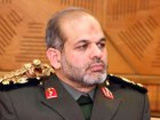Today.Az » World news » Iranian Defense Minister: This process will become one of the main factors preventing the militarization of the Caspian region
11 October 2010 [10:40] - Today.Az
Interview with Iranian Defense Minister, Brigadier General Ahmad Vahidi on the eve of his visit to Azerbaijan on Oct. 11.
 How do you assess the level of cooperation between Azerbaijan and Iran in the military and security spheres? What are the prospects of this cooperation?
How do you assess the level of cooperation between Azerbaijan and Iran in the military and security spheres? What are the prospects of this cooperation?
Iran and Azerbaijan have a very close proximity from historical, cultural and religious points of view and this has created conditions for the relations in all fields between the two countries to be at a good level. Relations in the military and security spheres are also at the high level. Will of the two countries' leaders in the development of relations indicates that they will also develop in the future.
So far, Azerbaijan and Iran have signed three agreements on cooperation in security sphere. What is the progress with their implementation and what achievements they have brought to Iran and Azerbaijan? What kind of issues will be discussed during your visit to Azerbaijan? Are there plans to sign new agreements?
The concluded agreements have been executed and they satisfied both sides. These agreements have yielded positive results for the two countries. Their implementation can play a great role in ensuring peace and stability in the region. During my visit to Azerbaijan, we will hold discussions with the political and military officials of the friendly and brotherly country. I hope this visit will accelerate the further development of relations between us.
Russia has refused to supply S-300 anti-aircraft missile system to Iran. Iran stated that it is capable of producing a system similar to S-300. Have you done any work in this sphere and what success have you achieved?
An agreement on the S-300 anti-aircraft missile system, signed with Russia, doesn't contain any contradiction to international obligations and laws. This issue has been clearly included in the text of the agreement signed by the two countries. On the other hand, Russia was to supply S-300 to Iran within two years prior to adoption of the UN Security Council's resolution No. 1929. And this resolution doesn't mention anti-aircraft missile systems. We believe that the fulfillment of obligations by the region's countries will lead to the achievement of common goals and interests, creating a strong interaction in the sphere of security and strengthening of mutual confidence. We never want such actions to be a black spot in the Iranian people's historical memory. Of course, as I said, the Iranian Defense Ministry's skilful specialists are working over the production of long-range anti-missile defense system. As it has been proved earlier, Iranian experts in the defense sphere have potential for self-sustaining operation.
How do you think about a possibility of militarization of the Caspian Sea and ensuring security of the sea?
The Islamic Republic of Iran considers the Caspian Sea as a sea of peace and friendship. Understanding this truth and development of this idea will lead to ensuring the interest of the countries in the region, establishment of permanent peace and development of comprehensive relations. This can be done within the joint agreements signed by the Caspian littoral countries, through mutual cooperation in important regional issues, through agreement with the principle of fairness and comprehensive mutual cooperation. Naturally, this process will become one of the main factors preventing the militarization of the Caspian region and lead to stability.
Some Western media outlets characterize Iran's military achievements as a risk factor in the Middle East and arms race. What is your opinion on this issue?
Western countries under the pretext of instability are trying to attribute their "chaos creating" image to other countries. They pursue their Islamophobia policy in the region by "Iranian threat", "Shia threat" and "Islamic threat". Such ideas can be assessed as a continuation of this policy. Iran's military doctrine is based on "active prevention" and "new and active defense" in the production of defense technologies. From this point of view, we believe that our defense power serves the Islamic world, strong peace and lasting stability in the region.
The 32-year experience since the Islamic Revolution has shown that our country is not a rival or threat to any country in the region, and considers itself as a country which has long-term common economic interests with them and cares about them. Western countries' policy, which is of propagandistic character, is pursued in accordance with the United States and Israel's strategy to create a panic. Hegemonic countries and the media outlets related with them fulfill this strategy in order to plunder the natural resources of the region's countries and peoples in accordance with their interests. By implementing the project of "Iranian threat" they try to justify their arms race in the region. They are trying to save their factories and enterprises producing arms from bankruptcy by the help of natural resources and capital of the region's peoples. By creating disagreements between the region's Muslim nations these countries are trying to obscure the seriousness of the "Zionist regime" danger, which is the main threat to the Islamic world. Therefore, the region's countries should be vigilant and not be deceived by the PR of the Western countries.
/Trend/
|
|